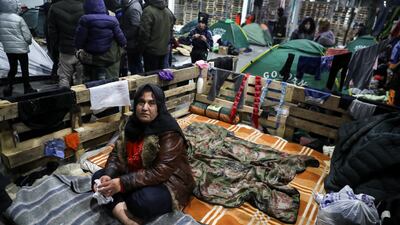An EU proposal to suspend asylum rules to deal with the border crisis in Belarus has been met with scepticism by humanitarian groups.
Brussels said the burden at the EU’s eastern border called for faster deportations, longer processing deadlines and for only the basic needs of asylum seekers to be guaranteed.
It came in response to an unprecedented flow of migrants towards the EU via Belarus, egged on by the country’s president, Alexander Lukashenko.
The resulting humanitarian crisis has led to at least 13 reported deaths, with many of the mainly Iraqi, Afghan and Syrian migrants left in limbo as winter draws in.
Although some of the responses to the EU’s formal consultation called for tougher measures to be taken, humanitarian experts said the right of asylum was being undermined.
The European Council on Refugees and Exiles, an umbrella group of 105 aid organisations, said providing only basic needs for a longer processing period “may not be in line with human dignity”.
In a 22-page response, it said the scope of the measures was poorly defined, meaning they could be applied beyond their initial remit.
“While the measures proposed are temporary and renewable there is a risk that they become permanent, in the manner of other temporary and exceptional measures,” it said.
The package “will have an adverse effect on the right to asylum without adequately responding to the situation at the EU’s borders with Belarus,” it said.
The European Commission said the six-month derogation from asylum rules would not compromise on human rights.
It would apply to three countries, Poland, Latvia and Lithuania, all of which are experiencing an increase in arrivals on a previously little-known route into the EU.
Under the softened rules, the three countries could hold asylum seekers for up to four months – rather than four weeks – before granting them entry and deciding their fate.
The requirement to meet basic needs, including food, clothing and shelter, differs from the EU’s standard rules on conditions at reception facilities.
These are meant to guarantee that asylum seekers receive education and employment as well as their basic everyday needs.
The EU called on the three countries to co-operate with the UN’s refugee agency, UNHCR, to ensure that people’s needs are met.
In another derogation, the three governments would be allowed to deny asylum claims that were not filed at specific registration points.
The ECRE response said Latvia, Lithuania and Poland must ensure that there are sufficient registration points and that they can be reached by migrants.
“If the latter criterion cannot be met, genuine and effective access to asylum procedures is not ensured,” it said.
There is also an option to override EU deportation rules and more quickly send people back to their home countries.
The watchdog Human Rights Watch previously said asylum rights were being “thrown into a frozen ditch” on the Belarusian border.
It said the EU risked creating a “terrible precedent” for managing future border crises.
Belarus is suspected of orchestrating the crisis to retaliate against ever-tightening sanctions linked to its repression of domestic dissidents.
Although most of the global condemnation has been aimed at Belarus, Poland has also been criticised for its treatment of migrants.
While the crisis has calmed somewhat, with some migrants moved away from the tense border area, Poland continues to report attempted crossings.
The EU separately announced on Tuesday that it would seek to overhaul the rules in its passport control-free Schengen zone.
Countries would be allowed to unilaterally bring in border checks for up to three months at a time in emergency situations.


